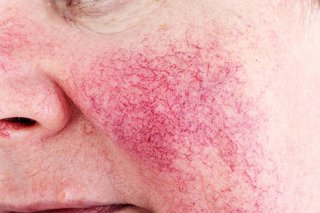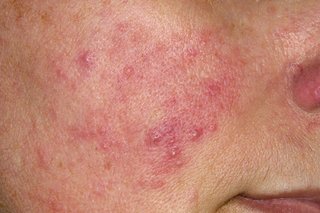Rosacea
Rosacea is a long-term skin condition that mainly affects the face. It's more common in women and people with lighter skin, but symptoms can be worse in men. Treatment can help with symptoms.
Symptoms of rosacea
The first signs of rosacea include:
- redness (blushing) across your nose, cheeks, forehead, chin, neck and chest that comes and goes, usually lasting for a few minutes each time – your face may also feel warm, hot or painful
- a burning or stinging feeling when using water or skincare products
The redness may be harder to see on brown or black skin.

MilanStock.com / Alamy Stock Photo https://www.alamy.com/portrait-of-unhappy-elderly-woman-suffering-skin-disease-rosacea-with-no-make-up-image232221864.html?pv=1&stamp=2&imageid=AAAE77AC-B1FF-4227-9947-3CF28F96864D&p=828889&n=0&orientation=0&pn=1&searchtype=0&IsFromSearch=1&srch=foo%3Dbar%26st%3D0%26sortby%3D2%26qt%3DRDPHA0%26qt_raw%3DRDPHA0%26qn%3D%26lic%3D3%26edrf%3D1%26mr%3D0%26pr%3D0%26aoa%3D1%26creative%3D%26videos%3D%26nu%3D%26ccc%3D%26bespoke%3D%26apalib%3D%26ag%3D0%26hc%3D0%26et%3D0x000000000000000000000%26vp%3D0%26loc%3D0%26ot%3D0%26imgt%3D0%26dtfr%3D%26dtto%3D%26size%3D0xFF%26blackwhite%3D%26cutout%3D%26archive%3D1%26name%3D%26groupid%3D%26pseudoid%3D32846%26userid%3D%26id%3D%26a%3D%26xstx%3D0%26cbstore%3D1%26resultview%3DsortbyPopular%26lightbox%3D%26gname%3D%26gtype%3D%26apalic%3D%26tbar%3D1%26pc%3D%26simid%3D%26cap%3D1%26customgeoip%3D%26vd%3D0%26cid%3D%26pe%3D%26so%3D%26lb%3D%26pl%3D0%26plno%3D%26fi%3D0%26langcode%3Den%26upl%3D0%26cufr%3D%26cuto%3D%26howler%3D%26cvrem%3D0%26cvtype%3D0%26cvloc%3D0%26cl%3D0%26upfr%3D%26upto%3D%26primcat%3D%26seccat%3D%26cvcategory%3D*%26restriction%3D%26random%3D%26ispremium%3D1%26flip%3D0%26contributorqt%3D%26plgalleryno%3D%26plpublic%3D0%26viewaspublic%3D0%26isplcurate%3D0%26imageurl%3D%26saveQry%3D%26editorial%3D1%26t%3D0%26edoptin%3D

DR P. MARAZZI / SCIENCE PHOTO LIBRARY https://www.sciencephoto.com/media/115955/view
Other symptoms can include:
- dry skin
- swelling, especially around the eyes
- yellow-orange patches on the skin
- sore eyelids or crusts around roots of eyelashes – this could be blepharitis
- thickened skin, mainly on the nose (usually appears after many years)
Triggers
It's not known what causes rosacea, but some things can make symptoms worse.
Common triggers for rosacea include:
- alcohol
- spicy foods
- hot drinks
- sunlight
- hot or cold temperatures
- aerobic exercise, like running
- being stressed
If you're not sure it's rosacea
Rosacea can look a lot like other conditions, such as:
- acne
- contact dermatitis, seborrhoeic dermatitis and other types of dermatitis
- lupus
- keratosis pilaris
Non-urgent advice: See a GP if:
- you have symptoms of rosacea
Urgent advice: Ask for an urgent GP appointment or call 111:
If you have rosacea and:
- your eye is painful
- your vision is blurred
- you're sensitive to light
- you have a red eye
- your eye feels gritty
These could be signs of keratitis, which can be serious if not treated urgently.
Treatment for rosacea
Rosacea cannot be cured, but treatment from a GP can help control the symptoms. It can get worse if it's not treated.
A GP may suggest:
- prescriptions for creams and gels you put on your skin
- taking antibiotics for 6 to 16 weeks
A GP may refer you to a skin specialist (dermatologist) if treatments are not working.
Things you can do to help rosacea
Rosacea is not caused by poor hygiene and it's not contagious. But there are things you can try to help with symptoms.
If you know a trigger like alcohol or spicy food makes symptoms worse, try to avoid it as much as possible.
Do
-
wear a high SPF sunscreen of at least SPF 30 every day
-
try to avoid heat, sunlight or humid conditions if possible
-
try to cover your face in cold weather
-
use gentle skincare products for sensitive skin
-
clean your eyelids at least once a day if you have blepharitis
-
take steps to manage stress
Don’t
-
do not drink alcohol
-
do not have hot drinks
-
do not eat spicy food
-
do not do too much aerobic exercise, like running
Find out more
The charity Changing Faces can offer advice and support if you're feeling anxious or depressed.
You can:
- call the Changing Faces support and information helpline on 0300 012 0275
- find out more about the Changing Faces Skin Camouflage Service
Page last reviewed: 17 March 2023
Next review due: 17 March 2026